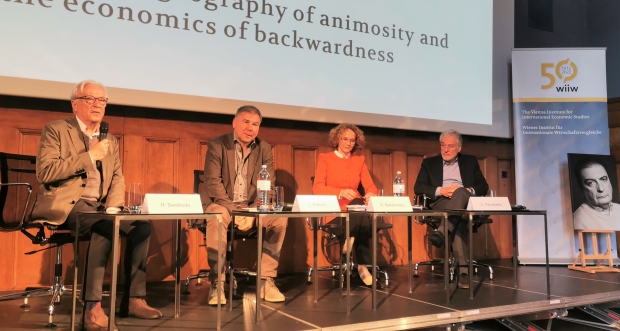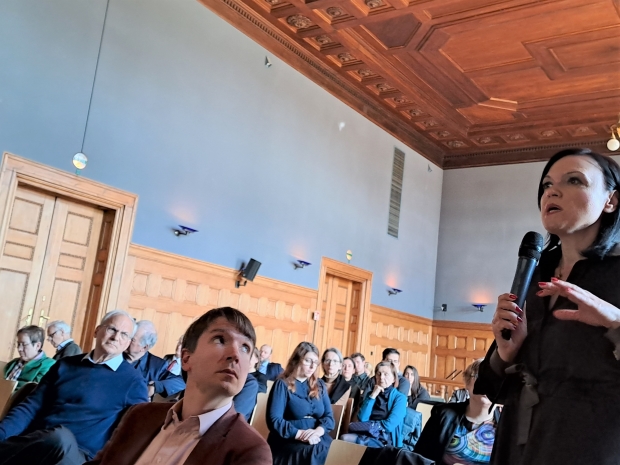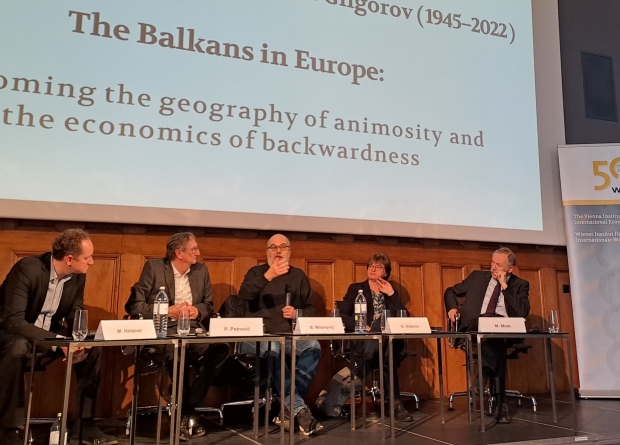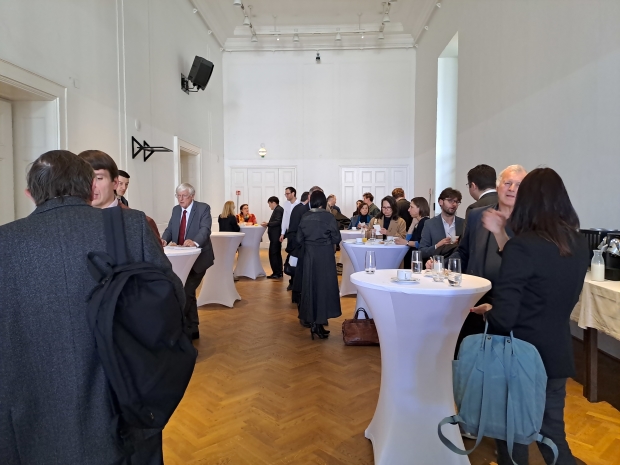Seminar in memory of Vladimir Gligorov: brilliant economist, Balkan expert and friend of wiiw
26 May 2023
Two high-ranking panels discussed ways to overcome the political divisions and economic problems in the Balkans
image credit: wiiw
By Iulia Barta, Michael Landesmann, Andreas Knapp
On 21 April 2023, the Vienna Institute for International Economic Studies (wiiw) held a special seminar at the Museum of Applied Arts (MAK) in memory of its former Balkan expert Vladimir Gligorov (1945-2022). Vladimir passed away in October 2022. He was not only a brilliant economist and social scientist more generally, but also a dear friend of the Institute. In his welcoming speech, Executive Director Mario Holzner paid tribute to his career and highlighted his friendship and scientific commitment to the Institute. Former Scientific Director Michael Landesmann - a long-time friend of Gligorov - recalled how confident Vladimir was in his scientific work and inspired many of his colleagues but never aspired to a high-ranking position himself.
In two panel discussions, a number of Balkan experts, long-term friends and admirers of Gligorov's work, including Branko Milanović and Ivan Krastev, acknowledged his work and legacy.
Overcoming the geography of animosity
Panel number one dealt with the question of how the political problems caused by the disintegration of Yugoslavia and the subsequent wars in the Balkans could be solved to make it easier for the Western Balkan countries to join the EU.
Radmila Šekerinska, Vice-President of the Party of European Socialists and former Deputy Prime Minister and Minister of Defence of North Macedonia, whose family is closely connected to Gligorov's, reflected on Vladimir's opinion that the disintegration of Yugoslavia was not inevitable, but a political decision of populist elites.
Ivan Krastev, Chairman of the Centre for Liberal Strategies in Sofia and Permanent Fellow at the Institute for Human Sciences (IWM) in Vienna, honoured Gligorov’s argument that the Balkans in many ways reflects characteristics of modern European states more generally. According to Krastev, after World War I it was indeed the multi-ethnic kingdom of Yugoslavia that was taken as a model by larger nations.
The subsequent discussion between Ivan Krastev, Radmila Šekerinska, Loukas Tsoukalis, President of the Hellenic Foundation for European and Foreign Policy, and Hannes Swoboda, President of wiiw, focussed not only on past prevalent problems in the Balkans, but also analysed a possible future of European integration. The panellists emphasised the delicate situation in the Balkans, the gradual departure from EU membership culminating in a loss of hope among the population, which has led to the rise of populism, corruption and instability. Šekerinska pointed out that problems that were prevalent in the Balkan countries are now emerging in the EU: “European nations were never smart enough to acknowledge the Balkans as a future for Europe, they (the Balkans) provided us with both worse case scenarios, but also good models to be followed”.
Loukas Tsoukalis stated that “the magic potion (of EU membership) is not as powerful, although EU enlargement makes a difference, it does not ensure the rule of law and it does not cure the disease.”
The first panel also discussed how the European promise once gave hope to the region and how that hope has diminished over time. "You don't win elections without stirring emotions, and the EU created those emotions – at least for a while". For some time, the prospect of EU membership allowed people to imagine a career in their homeland rather than in a Western European capital. The EU was the watchful eye that kept track of corrupt political elites, and for a time a pro-democracy spirit prevailed. But with France's tacit rejection of the Western Balkans' EU membership, the COVID-19 pandemic, the Bulgarian veto of Northern Macedonia's EU accession and other developments, this period of hope ended.
Loukas Tsoukalis pointed out that European enlargement has led to enormous diversity in which unanimity in decision-making no longer makes sense. As the future of European integration is diverse, it needs to be reformed. In his opinion, integration should be gradual, with accession taking place in steps of gradual (but full) participation in different programs, thereby making a difference in the waiting time of each candidate country.
Ivan Krastev emphasised the gap between the political elites and the public, despite their populist use of nationalistic rhetoric. Furthermore, after the refugee crisis, the public perception of politics changed, so that people believed Brussels was no longer interested in their problems. In his opinion, social media has further fuelled a nationalistic discourse and the division between the elites and the people.
Overcoming the economics of backwardness
The second panel was chaired by Mario Holzner, Executive Director of wiiw. On the panel were two of the most influential economists of the Western Balkans: Mojmir Mrak from the University of Ljubljana (Slovenia) who had played an important role in debt negotiations after the dissolution of Yugoslavia and was strongly engaged in Slovenia’s accession to the EU, and Pavle Petrovic from the University of Belgrade and president of the Fiscal Council of the Republic of Serbia. They were joined by Professor Branko Milanovic, former chief economist of the World Bank and now at City University of New York, and Hermine Vidovic, former Western Balkan expert at wiiw and a close colleague of Vladimir Gligorov for many years.
The panel initially recalled memories of the many instances in which Vladimir Gligorov provided insightful analyses of Western Balkan economic developments and how he influenced economic policy discussions in individual countries and in the region as a whole. The discussion then moved on to analyse economic developments in the Western Balkans rooted in the long-term historical trajectory of the region. The well-known Harvard economic historian Alexander Gerschenkron had coined the term "advantage of economic backwardness", and although less developed countries always have the potential to benefit from technology transfers and the institutional emulation of advanced economies, there was (and is) also the obvious fact that this potential is often not used. This very much applies to the Western Balkans, despite its close economic interdependence with the economies of Central and Western Europe. The discussion on this panel attempted to analyse the various reasons and combinations of factors that were or are effective in the region and which, on the one hand, block the exploitation of this potential, but on the other hand, could also enable these blockages to be overcome.
The discussion followed the approach which Vladimir Gligorov always took in his work, that is, to recognise that a proper assessment of economic developments requires detailed analysis of the complexities of individual countries’ social and political context, as well as close attention to how the international environment impacts political and economic processes within countries and their relationships with each other.




